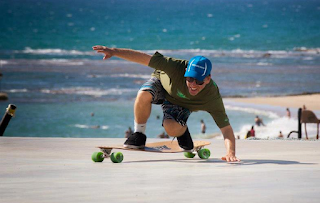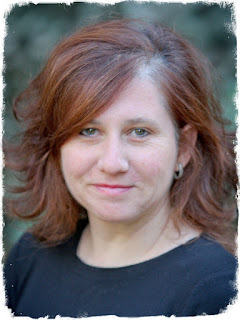Michael Brooke - life lessons from Skateboarding
Slight change of gears here - I thought to expand the blog pool to people who I find interesting, inspirational and just in general to get to know people who take a different slant on life. Feedback welcome! (Simon)
Michael Brooke is married with 3 kids and lives in Toronto, Canada
(he is also Simon's 1st cousin). He has spent over 40 years loving and making a
living from skateboarding. His magazine was read by millions throughout the
world.
Michael used the skateboarding as a springboard to spread peace and has had
great success with gangs in California, in Israel and in other parts of the
world through his Longboarding for Peace movement.
After finishing with the magazine and a short break, Michael has recently
completed his new book and started a new venture "Time for My Story".
- Is there one butterfly effect
story that you experienced - a small, but significant conversation or
event that led to something huge happening?
In 1996, I was working at Xerox trying to sell large-scale
printers to publishers. At that time, most publishers didn’t print their own
books - they sent them out to professional printers - so I wasn’t succeeding
too well. People wouldn’t even meet with me.
Finally, I managed to get a meeting with a publishing guy
who agreed to meet when I told him the printers could upload data to the
internet - which was a big deal in those days. As I was rolling through the
sales talk, I incidentally mentioned my skateboard website as an example. He
jumped on this and said his firm were looking to publish a book about
skateboarding and would I like to send him an outline.
I wrote an outline of the 40-year history of skateboarding,
the personalities of skateboarding and the culture. They accepted the outline
and gave me $3000 to start the book. I had done what JK Rowling sweated blood
and tears to achieve. Jumped the queues, jumped the multiple rejections, got
accepted by virtue of my $5-a-month website and wrote “The Concrete Wave”.
Here’s where it really gets moving. In September 98, I was
at a sports convention in LA dropping off fliers trying to promote my book. 6
months later, my publisher got a call from Spin magazine who had been at the
convention. They asked me to write an article about one of the topics from the
book – “The Lords of Dogtown” - a group of skateboarders in the 70s who had
greatly influenced skateboard culture.
I didn’t write the article but it was written and my book got a mention as it
was one of the few on the topic. This unsolicited advertising was the main
catalyst for the 42,000-copy sale of my book (a US best seller is 10,000
copies!). Following the book’s success, the article inspired a documentary and
the documentary led to a full-length Hollywood feature film. This in turn helped
to change the face of skateboarding culture.
After writing the book and realizing I had some flair in
the area of publishing, I decided to start a skateboarding magazine. I spent
$50 calling advertisers and was soon publishing a profitable monthly magazine,
a career I loved, that lasted 23 years. All this from a random mention of my
website while selling Xerox machines!
- What was your childhood dream -
did you realize it or did you build on the idea? Are you still trying to
accomplish your childhood dreams?
When I was 5, I wanted to be a fireman. That didn’t happen.
But it’s still on my bucket list to ride in a firetruck with the bells ringing.
But your dreams change over time.
Since then I have had 2 big dreams. I wanted to change the face of
skateboarding. This one I did accomplish. I dreamed it, visualized it, and it
happened. Skateboarding in those days was very “narrow”. I fought for inclusion
- older people riding, women, different board styles, different riding styles.
Eventually many of these ideas caught on.
My 2nd dream is to give back over the next 20 or
30 years – to help people capture their memories before they pass on. This has
been officially going 4 days since the launch of my website - www.timeformystory.com. Many people have
incredible stories or valuable experience to pass to their children or to the
world. People are living longer but with Alzheimer’s and when they pass,
obviously their stories are lost. I want to tell their stories, present them in
visually appealing, beautiful books so when the young, Instagram generation
open a memoir they don’t instantly reject a 20,000-word archaic object. It will
be an 18 or 36-page photo story with words, attractive and accessible. Another
added value we have is a fast turn-around – for an hour interview, we will be
producing a 2500-word photo memoir beautifully produced, within a week. Nobody
I have met has quite the skill-set – journalism, interviewing, publishing and
death care experience to be able to do this.
- What is one way that you delight
people?
One element I would say is surprise – to do something
unexpected that shows I am giving them attention. For instance, I left early
for work one day and stuck a whole bunch of post-it notes with messages on the
mirror for one of my kids.
Another important idea is giving people time. I am able to talk to just about
anyone. Some people find it hard to connect but just asking questions, taking
an interest makes friendships, improves relationships and creates a better
world.
- After you’ve tried everything
else, how do you get back on track if you’ve had an unproductive or
distracted period?
People think they need to take a vacation, spend less time
on the phone, or take a walk but that’s not going to do it. People need to get
involved in giving. This will pay back ten-fold – this is how you will get your
spark back. This is also the answer to the social media age. Social media
divides people and creates silos. Talking to people, giving of yourself and
your time builds bridges, builds character and rebuilds the harmony of the
world.
After the decline of the magazine in 2018, that was it. I
couldn’t write another word – the spark had gone. That’s why I started working
in the funeral home – to give back. When you are dealing with death and
grieving families, you cannot think about yourself. All the experience of giving, of service
allowed me to reset and recreate myself. I eventually merged the ideas from my
skateboarding experience with the completely different life of the funeral home
and started writing about death, spirituality and skateboarding in my new book
“the Endless Wave” https://ooksvision.wixsite.
One idea I want to share is the idea of balance. This is
essential for skateboarding. Too far to the right or left and you crash –
literally. Life is about continually finding a new balance through your
experiences.
The Hebrew word for balance is izun. I love the fact that
izun and oznayim, ears, are connected. If you really listen to your inner voice
or gut feeling, they are usually correct. On the other hand, by continually
listening to other people’s experiences, you learn to recalibrate, reprioritize
and constantly improve your balance.
- What do you consider as your
biggest achievement in the last 5-10 years?
On the public side, I have been involved in a movement
called
Longboarding for Peace. A few examples of what we did. We
engaged with
Southern California police departments and citizens in
exchanging guns for skateboards. We
promoted connection and understanding between conflicting
groups,
through the lessons of balance on skateboards, for instance
in Israel
between Jews and Arabs at the Peres Centre for Peace and in
other
countries.
On the personal side - since selling the magazine, I have
repaired
relationships within my family and made my marriage
stronger. In my
magazine years, I ran 24/7 sometimes putting a huge amount
of time into the business. In truth, I didn’t give enough time to my family. I
gave them what was left of the time I had after the magazine. This time
I’m reserving the time for family first!
- How do you connect or re-connect
to your children?
Even though we are not observant, I have found Friday night
dinners work well. We have been enjoying Friday night dinners for 33 years
together with the extended family. It’s important to check in with your family.
Spending time, getting together, being present. It’s hard to be present in this
age. That’s where we need to be putting in effort.
- Do you feel a spiritual connection
to this world? How does it manifest itself?
I am not observant but I feel spiritual. I believe there is
more out there than can be seen. But I believe different paths lead to the same
source or energy whatever the religion or spiritual path. My path now is being
with my family, giving back, trying to make human connections. Some of the
stuff we discussed may sound like it comes from a religious perspective but for
me, it’s about being a good human.
I am close to spirituality. When dealing with death so much
in the funeral parlour, it is something I think about a lot. A person is born,
they didn’t exist and suddenly they do. I experience people who have lived a
life and passed but they have left a mark on the world. It feels like there is
more.
- What really bugs you? How do you
try and fix something that is obviously not working well?
We have so much polarization. The media defines your world-view. Even before the modern era, the world was severely damaged - propaganda, advertising, convincing people one way or another. It has split the world. The only way to get out of the silos is to talk, communicate, give time to others. That’s why I think sharing stories can help. If I can inspire one person to break the current trends, connect more, and understand each other better, I will be content.




Comments
Post a Comment